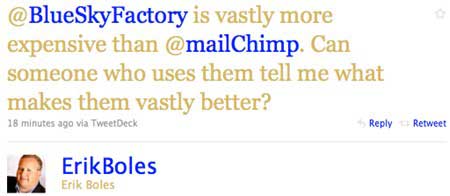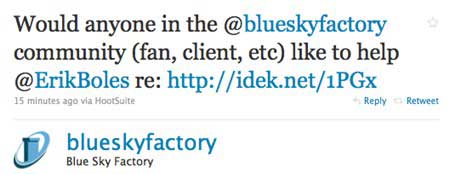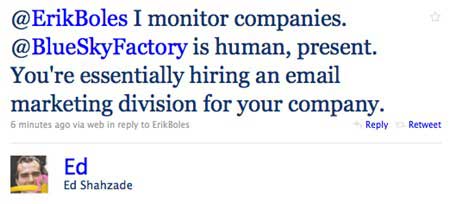"Ask and you shall receive."
If only it were that easy. For some reason, I've noticed an odd trend lately. It seems that people are spending a lot of time offering advice and sharing knowledge publicly, yet they are not asking for anything in return.
With social media being the hot ticket item and social-networking sites such as Twitter, Facebook, LinkedIn, and YouTube making it easy to share, everyone is doing so. Even those of us in the email-marketing world are talking about ways to use social networks to share (Blue Sky Factory did via a recent email-marketing webinar).
Before the comments section gets flooded with "What's wrong with sharing?" thoughts, let me be clear: I am 100% in favor of sharing. I share both personal and professional content all day long. In fact, I advocate that our clients, prospects, and fans share.
However, let's not forget the power of asking. It's OK to ask for something in return. That ask does not have to happen immediately, but don't be afraid to do it eventually.
There is a place for altruism, for sure, but remember that companies exist only if they are making money. In the end—from a business perspective—if you are not growing the company, you won't be around too long.
I believe that people struggle with asking for favors because it feels a lot like sales. However, we all are (or should be) in sales. Every person in your organization should be selling at some level. Where asking breaks down is that we forget that we earn the right to ask.
Let's take a look at a few examples of how we earn that right.
1. The Power of Asking: Trust and Pay It Forward
Recently, Erik Boles posted the following tweet:

I replied to Erik immediately, and then stepped back for a minute. Erik didn't care what I thought; he wanted to hear from the community. Part of my role as director of community is to facilitate that conversation. So, I did just that with the following tweet:

Within minutes, several replies to Erik appeared. I want to focus on this one, from Ed Shahzade:

Not long after Ed jumped into the conversation, I asked him why he went out of his way to reply. My request was simple, and not directed at him specifically.
Ed not only replied but also continued the conversation with Erik. He took time out of his day to explain to Erik why Blue Sky Factory was, in his view, the company. Ed's reply: "It's the 'trust agent' thing...I trust Brogan...have seen him trust BSF long time . . . have watched your posts and interaction with customers, problems, inquiries. Have watched what others say about BSF... And totally honest? There's an element of paying it forward. Not tit for tat, but my voice should give BSF folk trust to return props."
Ed—someone I've never met in person, emailed with, or spoken to on the phone—went out of his way when I asked the community for help. He replied because he trusted us. He "answered the call" with the hope that by paying it forward we'd eventually return the favor. Notice I used the word "hope," not "expectation."
Lesson learned: Instead of focusing on the sale initially, think about ways you can build trust. Continue to share the good work of others and help them with no strings attached. Hopefully, it will pay off at some point in the future.
2. The Power of Asking: A Good Product and Helpfulness
Jason Falls is a personal friend, business partner, and advocate. I recently picked up the phone, called Jason, and asked whether he would write a guest blog post. Without hesitation, Jason said, "Of course."
I asked Jason why a guy who has more requests in one day than he can humanly process write a blog post for another company. Jason's answer: "I said yes because I love the product... , love the service and support I get...and know that other people would benefit from hearing about it. Being a small part of helping them spread the good word was a no-brainer... If you weren't credible or I didn't trust you or the company, I would have said no."
There is that word again: "trust." Jason believed in the product, the service, and the support. He wanted to help. Jason also felt strongly that his words would resonate with his audience as well (creating a win-win).
Lesson learned: Social media has not changed the fact that your product or service must be solid. People don't endorse products they don't believe in. Also, if you can ensure that the outcome of asking a favor will be helpful to multiple audiences, you are more likely to be successful.
3. The Power of Asking: A Strong Relationship and Content
Like Jason, Amber Naslund is a friend, colleague and business partner, and an advocate. Amber's voice and influence stretch far and wide.
Recently, I contacted Amber and asked whether she would help promote a new product offering. I was a bit hesitant at first, but in the end it was well worth the effort (think: new leads).
I asked Amber why she helped promote the product. Amber said: "Simple and twofold. I know you guys produce good content worth sharing, and I have great business and personal relationships with several people there, so I wanted to be helpful."
She added: "Sometimes content is compelling without the relationship. Rarely is a relationship enough to encourage sharing of bad content. The two together are a no-brainer, especially because sharing it is so easy in social media (not like you're asking me to carry copies door to door)."
Amber's answer is an interesting one. As Jason and Ed both mentioned, you have to first believe in the product. A bad product becomes a tough sell to endorse.
However, Amber also introduces the importance of a strong relationship. She didn't say the word "trust" explicitly, but "relationship" is similar. To paraphrase, the combination of a strong personal and professional relationship and good content worth sharing is a no- brainer.
Lesson learned: Again, be sure you have a product or service that is good or great. Combine that with a strong relationship and a mechanism that makes it easy to share, and you have a winning combination.
One More Ask
I'd like to close with a little experiment using some of the lessons learned from above. If you enjoyed this article, I'd like to ask you to click the "Like" button at the top. If you want to take it a step further, I ask you to add to the discussion in the comments below, blog about the topic, or share the article with your social networks, family, and friends.
It never hurts to ask, right?




